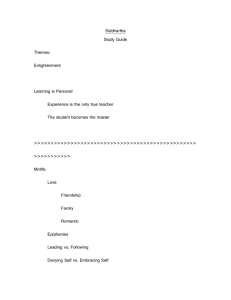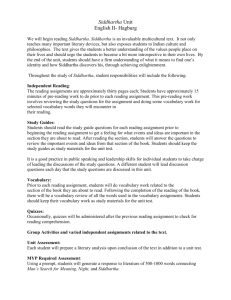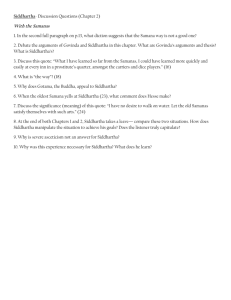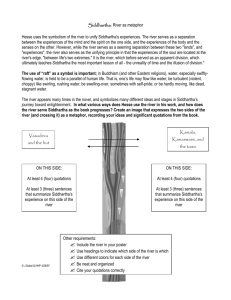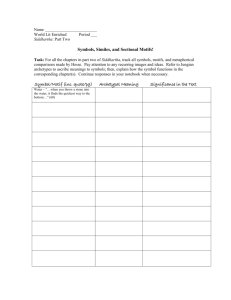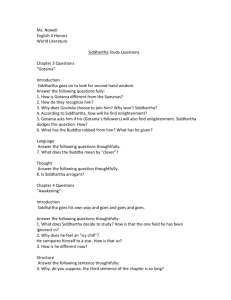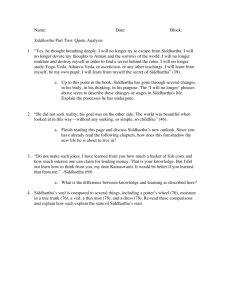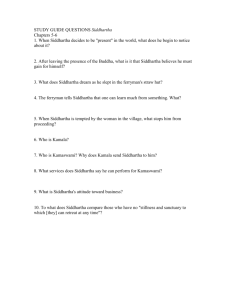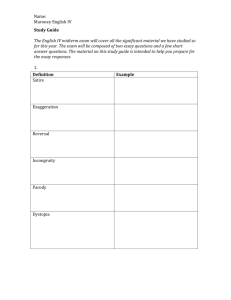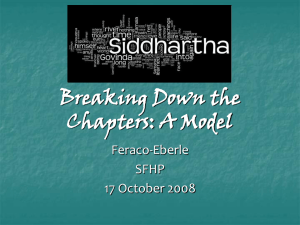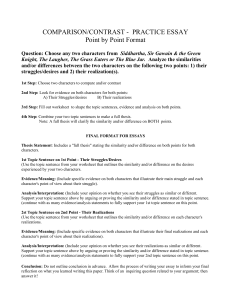Chapter 1 guide
advertisement
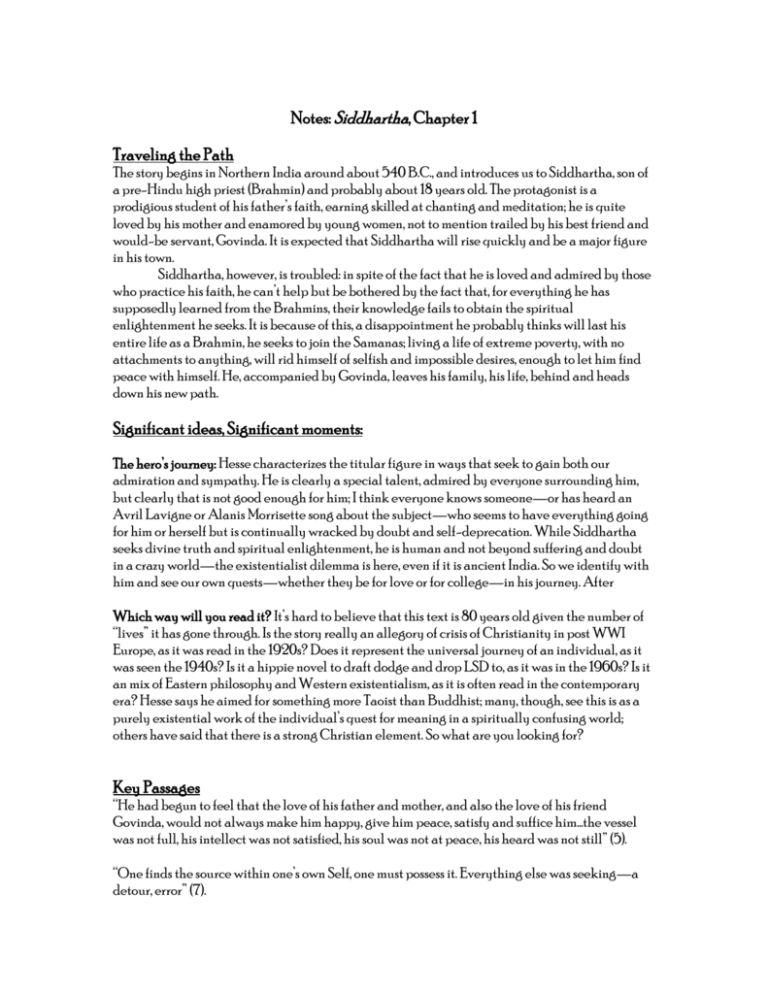
Notes: Siddhartha, Chapter 1 Traveling the Path The story begins in Northern India around about 540 B.C., and introduces us to Siddhartha, son of a pre-Hindu high priest (Brahmin) and probably about 18 years old. The protagonist is a prodigious student of his father’s faith, earning skilled at chanting and meditation; he is quite loved by his mother and enamored by young women, not to mention trailed by his best friend and would-be servant, Govinda. It is expected that Siddhartha will rise quickly and be a major figure in his town. Siddhartha, however, is troubled: in spite of the fact that he is loved and admired by those who practice his faith, he can’t help but be bothered by the fact that, for everything he has supposedly learned from the Brahmins, their knowledge fails to obtain the spiritual enlightenment he seeks. It is because of this, a disappointment he probably thinks will last his entire life as a Brahmin, he seeks to join the Samanas; living a life of extreme poverty, with no attachments to anything, will rid himself of selfish and impossible desires, enough to let him find peace with himself. He, accompanied by Govinda, leaves his family, his life, behind and heads down his new path. Significant ideas, Significant moments: The hero’s journey: Hesse characterizes the titular figure in ways that seek to gain both our admiration and sympathy. He is clearly a special talent, admired by everyone surrounding him, but clearly that is not good enough for him; I think everyone knows someone—or has heard an Avril Lavigne or Alanis Morrisette song about the subject—who seems to have everything going for him or herself but is continually wracked by doubt and self-deprecation. While Siddhartha seeks divine truth and spiritual enlightenment, he is human and not beyond suffering and doubt in a crazy world—the existentialist dilemma is here, even if it is ancient India. So we identify with him and see our own quests—whether they be for love or for college—in his journey. After Which way will you read it? It’s hard to believe that this text is 80 years old given the number of “lives” it has gone through. Is the story really an allegory of crisis of Christianity in post WWI Europe, as it was read in the 1920s? Does it represent the universal journey of an individual, as it was seen the 1940s? Is it a hippie novel to draft dodge and drop LSD to, as it was in the 1960s? Is it an mix of Eastern philosophy and Western existentialism, as it is often read in the contemporary era? Hesse says he aimed for something more Taoist than Buddhist; many, though, see this is as a purely existential work of the individual’s quest for meaning in a spiritually confusing world; others have said that there is a strong Christian element. So what are you looking for? Key Passages “He had begun to feel that the love of his father and mother, and also the love of his friend Govinda, would not always make him happy, give him peace, satisfy and suffice him…the vessel was not full, his intellect was not satisfied, his soul was not at peace, his heard was not still” (5). “One finds the source within one’s own Self, one must possess it. Everything else was seeking—a detour, error” (7). A number of questions, just because… Interpretive: To what purpose or effect do the series of rhetorical questions on pages 6-7 serve? (Your answer should tell you why I am so adamant about having you remove them from your paper) Interpretive: Why does Siddhartha speak of himself in the third person? Interpretive: Why did Siddhartha remain standing? Why didn't he just leave? Did Siddhartha's father allow him to leave because, in a sense, Siddhartha had "already left"? Why didn’t mom have a say? Reader Response: Why do you think Siddhartha, who seems to have everything going for him, is so discontent? Is he simply seeking the independence of adulthood? Reader Response: Based on your first impressions, does Siddhartha strike you as heroic and rebellious or naïve and arrogant? Here’s a really good, provocative question: Marxism tells us that how we define ourselves as individuals is not a private matter done by an inner voice; our identity is shaped by our interactions with other people. If you look at the quotes I’ve selected above, Siddhartha arrives at a totally different conclusion: other people are a distraction from discovering our "innermost self"; he leaves his loved ones because they are preventing him from obtaining this enlightenment. So do we know ourselves by our private consciousness or by the character displayed amongst other people? Provocative: Does doubt or skepticism in one’s faith enhance the personal experience of seeking an understanding of God, or does it threaten to overturn everything one knows and finds security in? Provocative: Why is it that the idea of breaking free of our parents’ hopes and plans for us is such a common pattern in literature, film, etc.? Must we do it to achieve independence, our own sense of identity? Can and should a teenager have an extremely close relationship with their parents? Or is the rebellion a necessary—even healthy—thing?
